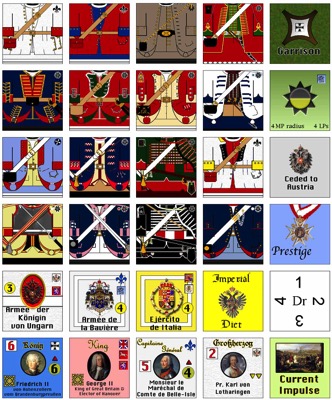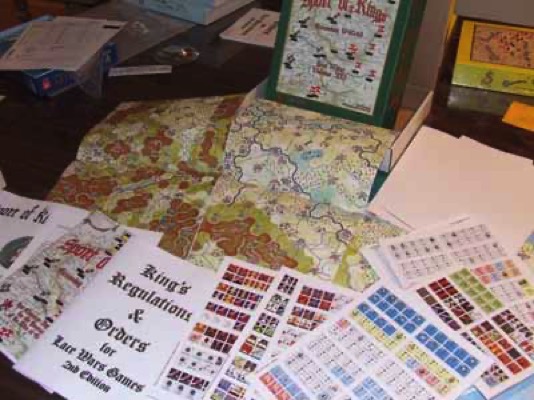Sport of Kings: Germany 1740-45
Volume III in the Lace Wars Series
The Game
Sport of Kings (SoK) is an operational study for two or three players that looks at the activities in two regions: Prussia's fight with Austria over Silesia, Moravia, and Bohemia, and France's fight with Austria in the Rhineland, Bohemia, and Upper Austria. It is the third of a set of four games covering the War of the Austrian Succession. From 1741 to 1748 this relatively unknown conflict raged on the continent of Europe. The primary land actions took place in three theatres: the Low Countries, Germany, and Italy. SOK covers the German theatres of Silesia, Moravia, Bohemia, Bavaria, and the Rhineland, beginning with the outbreak of war in 1740 and running until 1745, when Prussia withdrew from the conflict and the emphasis shifted to other theatres.
The rising state of Prussia, under her soon to be famous king, Frederick the Great, sought to obtain a place in the sun at the expense of her southern rival, the Habsburg Empire. In uneasy league with Prussia was France, with no territorial ambitions, but with the complementary desires of keeping the Habsburgs humble and establishing a strong political buffer zone in central Germany.
Roped into this three-way split were most of the powers of Europe, big and small. France fought as the auxiliary of the Bavarian Elector, Charles Albert, bidding to replace the Imperial Habsburg dynasty with his own Wittelsbach. Britain backed the Austrian Habsburgs, following her traditional balance-of-power mantra - but her king, George of Hanover, favoured the Bavarians. Saxony, caught in the middle, ran from side to side, always managing to back the wrong horse. Hanover and the United Provinces after much arm-twisting, supported Britain. Lesser participants included the states of Pfalz (a Wittlesbach realm), Denmark, Hesse, and many of the 300+ states of the Holy Roman Empire. Spain and Russia, although not present, influenced decision-making with their actions elsewhere.After five years of war, much of central Europe was laid waste. An Austria that had been in rapid decline, emerged stronger than ever under her dynamic Queen, Maria Theresa - despite repeated hammer-blows from Prussia and the Franco-Bavarians. Prussia did well, acquiring the lucrative province of Silesia, but she was forced to take a break and would not reappear on the scene until the Seven Years War. France and her Bavarian ally were utterly routed, putting paid to the dreams of a Wittelsbach Empire and French domination of Germany. But while Bavaria was put under the Habsburg yoke, France was ramping up for a new struggle against a new imperial power - Britain.
The effect of this war would be, as Voltaire quipped, the transfer of a single province - Silesia. But it also cost Europe some 500,000 dead; and it solved nothing, merely fuelling resentments that would burst forth in the titanic Seven Years War. Nevertheless, there is great scope for you as the King's Captain General. Germany has always been a place for military reputations to be made or broken. As Prussia's outstanding commander, you must engage in lightening campaigns against a colossal foe, using the threat of a two-front war to force Austria to negotiate instead of counterattacking. As France's greatest living marshal, you must help the Bavarian Elector to the throne of the Empire, then keep him there. The Prussians may help, but then again, they may not - Frederick is ever an untrustworthy ally. As Maria Theresa's bulwark, you must defend the vast Habsburg realms from attack on two sides - while your resources are siphoned off to deal with threats in Flanders, Italy, and on the Turkish frontier. Britain will help, but don't trust their politicians and generals, just take the gold they offer so freely.
Components
1) Six map sections representing Germany from the Rhine to Poland, derived from a mix of modern cartography and period maps dating from 1715 to 1750. Scale is 8.5 miles per hex (roughly 4 leagues per hex).
2) 1620 representing contingents from France, Britain, Holland, Austria, Hesse, Bavaria, Kurpfalz, Saxony, Denmark, Hanover, Prussia, and even Russia!
3) Rules, charts, tables, and display cards.
4) An historical commentary.

